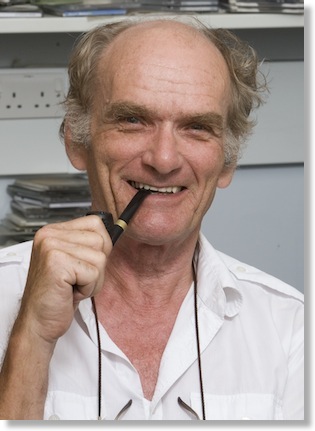
David Colquhoun, PhD, FRS
Fellow
Board of Directors
London, UK
“If all we had to worry about was a few potty homeopaths and astrologers,
it might be better to shrug, and get on with some real science.
But now the endarkenment extends to parliament, universities and schools,
it is far too dangerous to ignore.”
David Colquhoun, PhD, FRS, is a noted British pharmacologist. He held the A.J. Clark Chair of Pharmacology at the University College of London (UCL) from 1985 to 2004, Honorary Director of the Wellcome Laboratory for Molecular Pharmacology, and is now is an Honorary Fellow (2004) and research assistant at UCL.
Since 2001, Dr Colquhoun has run DC’s Improbable Science, a wildly popular blog and website (with over 2,000,000 hits) and Twitter account (with over 2,000 followers). These sites are dedicated to critical assessment of “Alternative Medicine” and other forms of pseudoscience and science fraud. Lately he has taken an interest in more general problems of inference in clinical trials, science policy, and science communication. He has been particularly critical of a number of United Kingdom universities that offer science degrees incorporating pseudoscientific courses such as homeopathy and acupuncture.
In December 2009, Dr Colquhoun won a freedom-of-information judgment, requiring the University of Central Lancashire to release details of their undergraduate course in homeopathy.
Dr Colquhoun is well known as author of Lectures in Biostatistics (Clarendon Press 1970; Oxford University Press, 1996). With statistician Alan G. Hawkes, he developed the stochastic theory that describes single-ion channel recordings as a Markov process, and developed maximum likelihood methods that allow inference of mechanisms from experimental records with exact allowance for missed events. This has resulted in a series of experimental and theoretical papers about single-ion channel mechanisms. Besides UCL, Dr Colquhoun has worked at Yale University in America and at the University of Southampton.
Earning his PhD in 1964 at the University of Edinburgh, where he studied the binding of immunoglobins to lung tissue, Dr Colquhoun became a Fellow of the Royal Society in 1985.
Award:
Selected Publications:
- “These misleading beliefs are curing no one’s ills,” The Independent, 2010 Aug 3.
- “Climate scientists must be ruthlessly honest about data,” The Guardian Environmental Blog, 2010 Mar 4. If we want the public to continue to trust us as scientists, we must be absolutely open and never resort to spin or PR.
- “Climate: science, politics and honesty,” DC’s Improbable Science, 2010 Feb 18.
- “Should the NHS fund homeopathy?” The [Sunday] Times, 2010 Feb 26. (Invited comment on report of Science & Technology Select Committee)
- “Secret remedies: 100 years on,” British Medical Journal, 2009 Dec 10; 339():b5432. [DOI] This editorial drew responses from health minister Mike O’Brien and Prof Pitillo to which Dr Colquhoun replied: discussion, 2010 Jan. [DOI]
- “Information tribunal rejects appeal by University of Central Lancashire. Freedom of Information wins!” DC’s Improbable Science, 2009 Dec 8.
- “Trust me, I’m a scientist,”British Medical Journal, 2009 Sep 9; 339():b3658. [DOI] The biggest problem in science communication is the public’s lack of trust in the scientific establishment, argues David Colquhoun. The solution, he says, is for scientists to bypass the PR people and take up blogging.
- “Homoeopathic product licence: MHRA label seems to be illegal,” British Medical Journal, 2009 Jun 9; 338():b2333. [DOI]
- “Regulating quack medicine makes me feel sick,” The Times, 2008 Aug 29. If alternative remedies are either untested or ineffective, why are we promoting them?
- “The age of endarkenment,” The Guardian, 2007 Aug 15. Why is no one questioning the rise of new-age nonsense in the name of science?
- “Science degrees without the science,” Nature, 2007 Mar 22; 446(7134):373-374. [DOI]
- “Should NICE evaluate complementary and alternative medicines?” British Medical Journal, 2007 Mar 8; 334(7592):507. [Extract] While Linda Franck and colleagues had argued that a thorough review of CAM by NICE would benefit the NHS and patients, Dr Colquhoun argued that it cannot afford to re-examine evidence for things that have shown so little benefit.
- “Treating critically ill patients with sugar pills,” Chest, 2007 Feb; 131(2):645. [DOI]
- “How to get good science," Physiology News, 2007 Winter; (69):12-14.
- “Homoeopathy: a relict ot the past or medicine of the future?” (with M Brands), Focus on Alternative and Complementary Therapies, 2005 Dec; 10(4):278–80. [DOI]
- “Should medical students be taught about CAM?” (with MJ Verhoef), Focus on Alternative and Complementary Therapies, 2005 Jun; 10(2):101-103. [Abstract]
- “Abuse of prisoners at Abu Ghraib,” Science, 2005 Mar 25; 307(5717):1873b-1875b. (Comment on Science, 2004 Nov 26; 306(5701):1482-1483.) [DOI]
- Lectures on Biostatistics: An Introduction to Statistics With Applications in Biology and Medicine (Oxford University Press, 1996).
Online Videos:
- “Homeopathy Report,” BBC News Channel, 2010 Feb 22:
- “Science in an Age of Endarkenment,” Center for Inquiry, Ontario, 2008 Jan 25:
Part 1
Part 2
Part 3
Part 4
In the News:
- “Is a degree in homeopathy a sick joke?” by Richard Tomkins, Financial Times Magazine, 2009 May 23. About Dr Colquhoun’s work: “[He] has been waging a six-year war against a particular subset of such ‘non-courses’ identified by the Alliance. His campaign specifically targets science degrees in complementary and alternative medicine such as homoeopathy, naturopathy and nutritional therapy, subjects he condemns as quackery and anti-science.”
- “The worst five universities offering ‘bogus’ degrees in alternative medicine have been exposed by experts,” by Laura Clark, [Daily] Mail Online, 2008 Apr 24.
- “The mighty David Colquhoun,” by Ben Goldacre, The Guardian, 2007 Jun 9.
- “An uncommon scientist with a lot of common sense,” Molecular Interventions: Crosstalk, 2002 Jun; 2(3):128-131.
Podcasts:
- Science degrees without the science, Nature, 2007 Mar 22.
The Online David Colquhoun:









